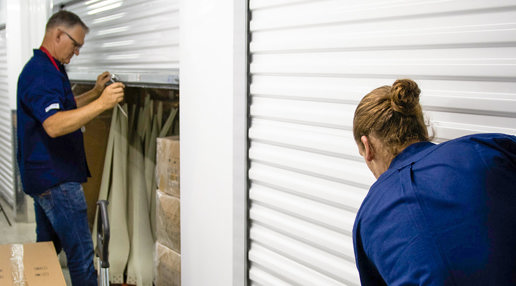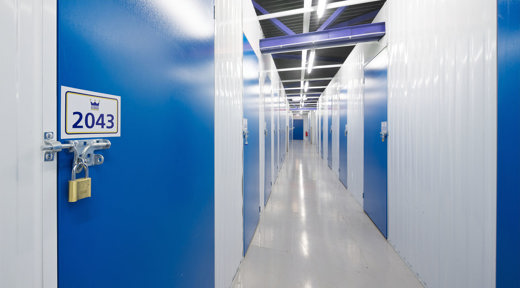Self storage is a fortress for your most treasured belongings. These facilities are equipped with state-of-the-art security, manned reception desks, and smart locks even Harry Houdini would struggle to pick. But they aren’t invincible.
Whether it be fire, floods, or a freak bear attack, unexpected events do happen. And in these unforeseen circumstances, it’s not the plump bubble wrap or double-walled steel doors that’ll ensure your goods are protected (although they do help); no, it’s self storage insurance.
If you’ve only just learnt about self storage insurance, then join us as we shed some light on the ins and outs of insurance for storage units, answering key questions like, “how does it work?”, “what does it cover?”, and “do I really need it?”.
What Is Self Storage Insurance?

Put simply, self storage insurance is a type of insurance coverage specifically designed to protect your belongings in a self storage facility. That could be a designer sofa, business stock, or all the contents of your home.
Think of it as a safety net for your belongings. It helps cover the financial costs if your stored items get damaged, stolen, or destroyed due to covered events like fire, theft, vandalism, or natural disasters. However, this will depend on the policy terms in your rental contract.
How Does Self Insurance Work?
Now, you might be wondering how self storage insurance works. As it’s a requirement at most facilities in the UK, providers make it quite simple and easy. It’s usually a separate insurance policy that you take out when you sign a lease agreement with a self storage provider.
Here’s how it works:
Step 1: Choose an Insurance Provider
Most self storage facilities require you to sign an insurance policy through them, although some might give you the option to seek coverage from a third-party insurance company. This could be a UK insurance provider or you might be able to cover contents in storage on your household or business insurance policy.
Step 2: Review Policy Terms and Conditions
Carefully read and understand the terms and conditions of the insurance policy. Pay attention to coverage limits, exclusions, deductibles, and any additional requirements or provisions. Self storage companies use a tailor product which
Step 3: Declare the Value of Stored Items
Once you’ve decided on a provider, you'll need to declare the value of the items you plan to store. This will determine the premium you'll pay and ensure adequate coverage, so be thorough and leave no box unticked.
When you move your items into storage, ensure that you comply with any specific storage guidelines or security measures outlined by the facility. Failure to comply might result in a breach of contract that could leave you completely uncovered.
Do I Need Insurance for My Storage Unit?
In short, yes, you need to insure the contents in storage. Broadly speaking, storage unit insurance is a legal requirement when you sign a lease. Facilities do this to ensure that you have adequate coverage for the belongings you store with them.
Additionally, this protects the facility from potential liability claims if your items are damaged or stolen, maintaining a standard level of protection and providing you with peace of mind.
For business, storage insurance can help speed up the recovery process and minimise the disruption to your business operations. With full coverage, you can replace damaged inventory, equipment, or other essential items quickly, saving time and money.
What Does Self Storage Renters Insurance Cover?

Self storage insurance typically provides coverage for the contents in a self storage unit. This coverage includes actual physical loss of or damage to your property, caused by:
- Fire
- Lightning
- Explosion
- Earthquakes
- Storms
- Flooding
- Bursting and/or leaking pipes
- Ingress of water or other liquid substances
- Aircrafts, or articles dropped therefrom
- Moths, insects, or vermin from an external cause
- Theft accompanied by forcible and violent entry
- Riots
- Strikes
- Civil commotion
- Malicious damage
- Impact by vehicles or railway rolling stock occurring whilst your insurance is effective
This insurance is effective from the time you move in; however, some facilities might include coverage during loading and unloading, or during transit.
What Doesn’t It Cover?
The following items are usually not covered by self storage insurance:
- Money, coins, bullion, deeds, bonds, securities, and similar items
- Livestock, plants, explosives, and flammable materials
- Jewellery, watches, precious stones, and stamps exceeding a specific value
- Furs, fine arts, perfumery, mobile phones, tobacco, cigars, cigarettes, beers, wines, spirits, and similar items exceeding a specific value
- Electronic items exceeding a specific value
- Depreciation after repairing or restoring a damaged item
- Any property that you are not allowed to store according to the licence agreement
- Loss of data records, excluding the cost of blank data storage materials
- Losses resulting from war, invasion, acts of foreign enemies, civil war, rebellion, revolution, insurrection, or government order
- Indirect losses resulting from claims made for property loss or damage
- Loss or damage caused by nuclear reactions, radioactivity, or nuclear weapons
- Loss or damage caused by chemical, biological, biochemical, or electromagnetic weapons, or the use of computer systems for harmful purposes
- Loss or damage caused by pressure waves from supersonic aircrafts or other aerial devices
- Loss or damage caused by acts of terrorism
Does Homeowners Insurance Cover Storage Unit Contents?
Homeowners insurance is designed to protect your personal belongings against certain events like theft, fire, or vandalism. But, there might be limitations and exclusions when it comes to content stored in a storage unit.
In some cases, personal insurance may provide limited coverage for items stored off-premises, including storage units. But this coverage is often subject to certain conditions and restrictions.
For example, there might be a maximum limit on the coverage amount for items stored outside of your home, or it might not provide coverage for certain risks that a storage facility typically would, like earthquakes, riots, or strikes.
Remember that insurance for self storage is designed specifically for contents in storage and the unique risks that come with it. So even if your homeowners insurance provides basic coverage, it might not protect you against certain perils.
Storage unit insurance might seem overwhelming, but it can be super simple with the right facility. If you’re in need of secure self storage in the UK, Storage King can help you find an affordable unit with coverage for your belongings.

To find out more about self storage unit rental in the UK and the insurance options we offer, contact us at 0800 0852 954 or request a price online.


 0800 0852 954
0800 0852 954




